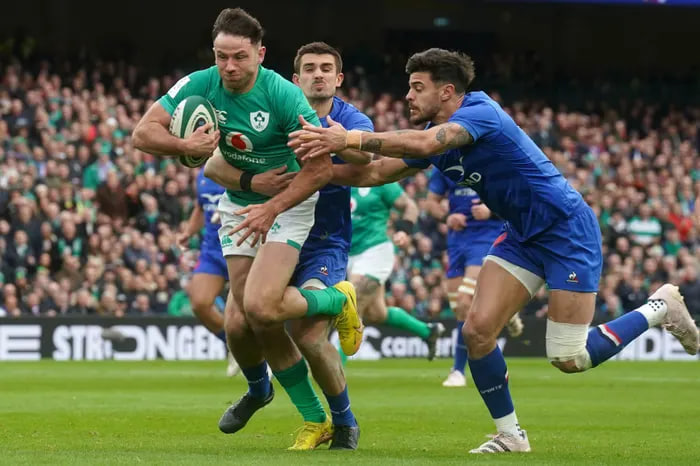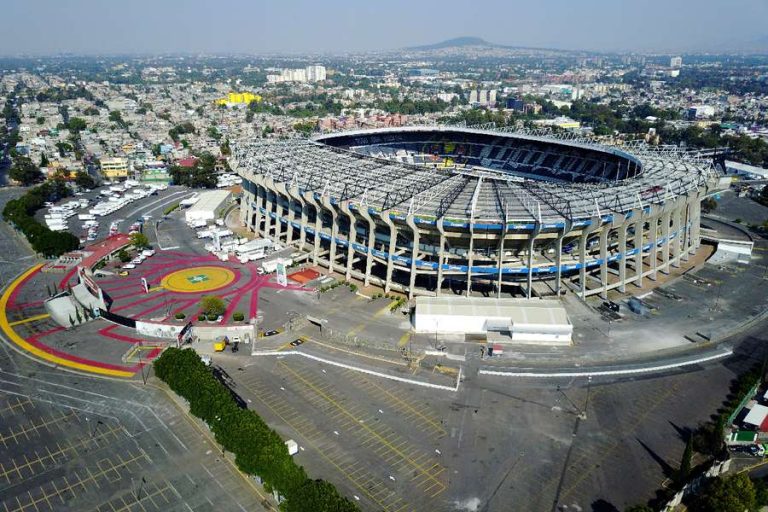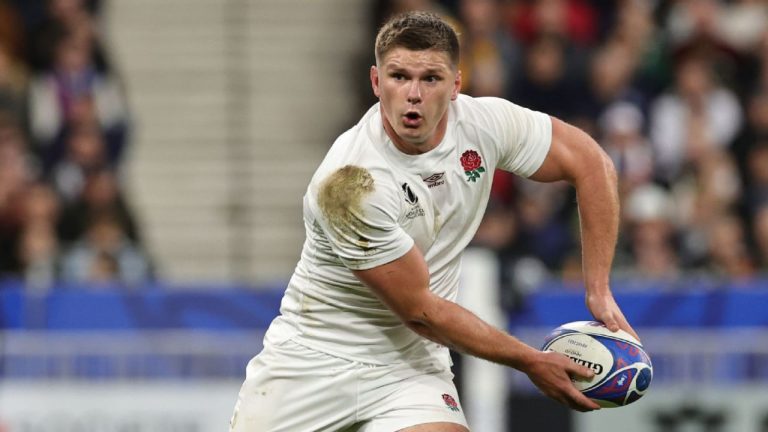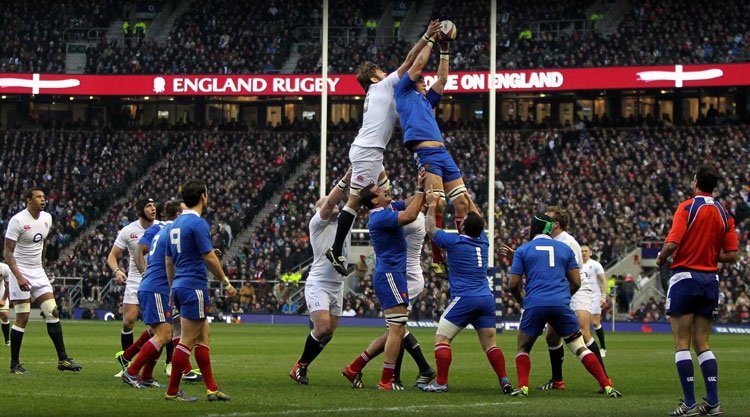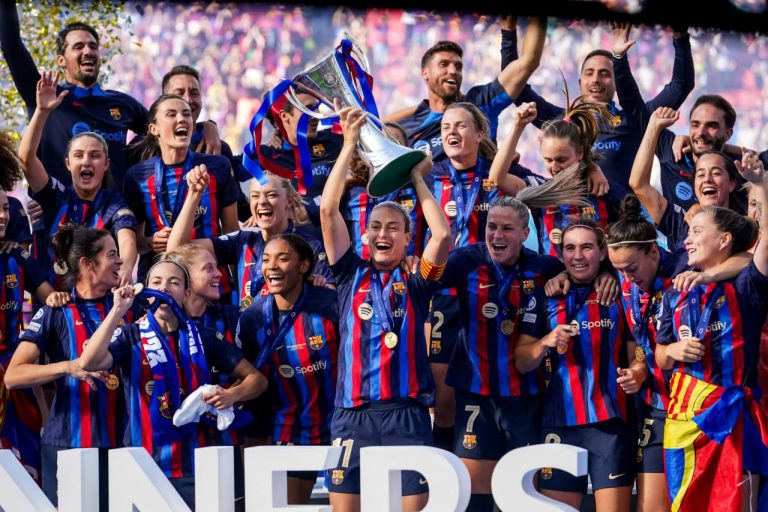France vs. Ireland Sets Stage for Exciting Six Nations Opener
In a departure from the traditional approach of boxing, where rival opponents were promptly reunited, this year’s Six Nations Championship kicks off with a contest that meets all the requirements of a thrilling prime-time event. The opening match on Friday features a highly anticipated clash between France and Ireland in Marseille, reminiscent of the Rugby World Cup final that eluded fans just three months ago. The bold scheduling choice carries the risk of heightened expectations, yet promises an electrifying start to the competition that is likely to capture widespread attention, even in countries like South Africa and New Zealand, which contributed to the World Cup final.
If the upcoming match is even half as thrilling as the last Six Nations encounter between France and Ireland in Dublin a year ago, it promises to be a win for everyone involved. Both teams are eager to bounce back from their disappointing quarter-final defeats to South Africa and New Zealand in Paris in October. The familiarity of the Stade de France, if not undergoing upgrades for the Olympics, would amplify the sense of déjà vu.
While it’s too simplistic to guarantee that the winners on Friday will secure the 2024 title, the victory will provide a significant early advantage. Interestingly, Ireland has never won a Five or Six Nations title in the year following a World Cup. Overcoming this historical pattern becomes even more challenging should they stumble in Marseille against a motivated French team.
Despite the absence of Antoine Dupont, currently competing in sevens for Olympic gold, and a few injuries, Shaun Edwards’s motivational coaching expertise suggests an energetic response from the French side. Although missing out on the World Cup was undoubtedly painful, the focus is now on seizing the opportunities of the present.
The recent performances of Damian Penaud, Grégory Alldritt, Matthieu Jalibert, and Thomas Ramos have been a cause for concern for France’s opponents. Bordeaux and Toulouse have been standout club teams in Europe, and France could soon benefit from their success. While their last-eight defeat to the Springboks highlighted deficiencies in accuracy and tactical composure, the talent from the Top 14 league remains promising. When Emmanuel Meafou, an Australia-raised lock with imposing physical attributes, is back in action, France’s threat level is expected to rise even more.
An Ireland side without Johnny Sexton lacks the same strategic prowess. Andy Farrell emphasizes that building successful teams requires gradual changes, and his experience as a serial winner supports this approach. However, replacing Sexton, a longstanding talisman, poses a considerable challenge. The likely successor at fly-half, Jack Crowley from Munster, faces the daunting task of filling Sexton’s shoes this season.
While Peter O’Mahony is a resilient stand-in captain, the unfortunate absence of the unconventional Mack Hansen due to injury is poorly timed for Ireland. If they cannot secure a victory against France, overcoming a post-World Cup hangover might prove more challenging for Ireland compared to some other teams.
Two other crucial matches in the initial three rounds involve Scotland playing at Murrayfield. France might momentarily hesitate in their fixture against Scotland, especially in Edinburgh, where adverse weather conditions and various disciplinary issues have previously posed challenges. If Scotland manages to win, adding to their away victory against a rebuilding Wales, it would set the stage for an intense Calcutta Cup clash. Admittedly, such expectations are expressed every year, but with Finn Russell orchestrating plays, Scotland has the potential to trouble any team on a given day.
This is another significant reason why achieving a grand slam in the Six Nations will be more challenging than ever. While France and Ireland demonstrated a higher level of quality compared to other teams at the World Cup, factors such as refereeing interpretations, rulings on high tackles, and defensive line speed can still impact the outcomes. The unpredictable bounce of a rugby ball remains the most influential variable.
As for Wales and Italy, having consistently occupied the bottom two positions in the standings over the past two seasons, they face a tough challenge to avoid a third consecutive bottom finish. Italy, following a disappointing World Cup, has three away games, though the improved performance of Benetton Treviso provides a positive aspect. Wales will need something exceptional to defeat France or Ireland, but Warren Gatland is relishing the opportunity to work with his latest group of dynamic young players. All they require is a bit of guidance – let’s call it Gat-nav – and some early momentum.
This leaves England, determined to shed their recent reputation for underachievement. The introduction of an optimistic new captain in Jamie George and some promising young backs has brought a different atmosphere to their training camp in Girona. They are aiming to defend with greater urgency and vigor, looking to incorporate a more proactive element into the basic attacking framework established during Steve Borthwick’s inaugural year in charge.
While not revolutionary, the statistics reveal a telling narrative: England has failed to secure more than one try bonus point in their last four Six Nations campaigns. Simply attributing this to the “squeezed middle” of the field as a justification for kicking the ball away is unlikely to attract new audiences to a sport that increasingly needs them. Encouraging teams to take more calculated risks or implementing measures to reduce the prevalence of box kicking outside a team’s 22 would be beneficial.
On another note, a couple of lingering issues also require addressing. Is it appropriate for England, Scotland, and Ireland to conduct Six Nations training camps in countries that, as things currently stand, are excluded from competing in the championship themselves? Additionally, when will the much-anticipated introduction of a 20-minute “orange card” for non-deliberate head clashes occur, addressing the critical need to lower tackle heights while simultaneously reducing instances of fractional red cards?
The positive aspect is that the Six Nations continues to provide a soulful experience that even dedicated Netflix film crews cannot replicate. Although JPR Williams is no longer with us, the hope is that this tournament will generate more enduring memories akin to the indelible ones he was known for. While I favor France to lead the way, what rugby truly requires is another captivating spectacle.

